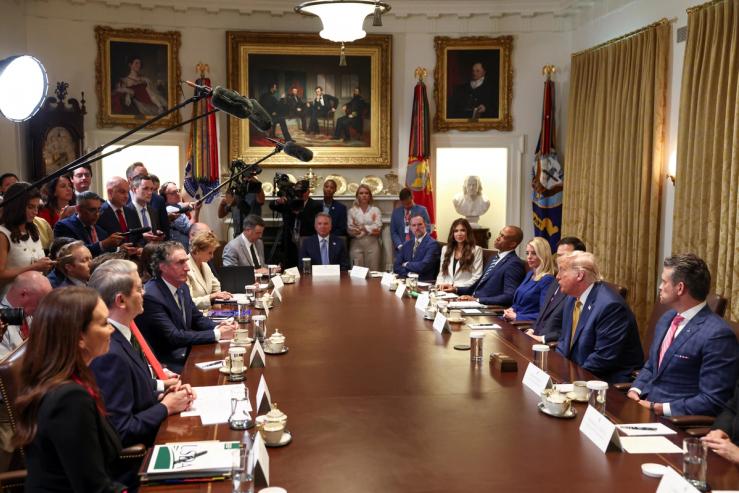Ben’s view
It’s a piece of conventional wisdom on the new American right that Donald Trump struggled in his first term because he hired the wrong people — old-think Bush Republicans, figures like Rex Tillerson and Steven Mnuchin, who didn’t have a populist bone in their bodies.
Trump’s most passionate supporters weren’t going to make that mistake again. They created initiatives like American Moment, Project 2025, and others aimed at grooming and credentialing a cadre of MAGA appointees. When Trump took office, the America Firsters moved en masse into the Department of Defense. Big Tech avengers seized the antitrust apparatus. Conspiracy-minded podcasters took over the FBI.
And yet — just as Trump often ignored his conventional advisers in the first term, he’s stunned loyalists by sweeping aside this carefully assembled apparat in 2025. He ignored the DoD aides who opposed an attack on Iran, and humiliated his nominal top spy, the anti-establishment Tulsi Gabbard, when she downplayed the Iranian nuclear threat. He’s left the bloggers to defend keeping Jeffrey Epstein’s secrets. He’s replaced talk of sinister tech monopolies with embracing Big American Tech, largely refashioned as Big American AI.
“It turns out that personnel isn’t policy,” the executive director of The American Conservative, Curt Mills, told me glumly over lunch in Washington last week.
Mills was reflecting on a truism of American government that is, usually, true. Trump’s predecessor, Joe Biden, handed off pieces of the regulatory apparatus to allies of his primary competitor Elizabeth Warren, producing a domestic policy that pleasantly surprised his party’s left and infuriated American business leaders. A few parts of Trump’s second administration have followed the same pattern: Robert F. Kennedy Jr. and his aides have chipped away at longstanding bipartisan health policy. Trump’s preference for fossil fuels over renewable energy has been mirrored in appointments and a raft of policy changes across the government.
But on the highest-profile issues, the ones that attract Trump’s own boundless energy and attention, the president has largely ignored his new staff.
In this article:
Know More
Former Trump adviser Steve Bannon, who now hosts the popular populist show War Room, lists three pillars of MAGA: a modest America-first foreign policy; a turn away from global trade and toward domestic manufacturing; and a crackdown on immigration. Allies of Bannon, Mills, and Tucker Carlson, are scattered through mid-senior roles in Washington.
In the Defense Department, a new generation of analysts aligned with policy chief Elbridge Colby arrived with deep worries about scarce munitions and a mission of focusing and narrowing defense policy. They advocated pulling away from Ukraine and the Middle East in favor of buttressing defenses against China. Trump appointed an old friend, Steve Witkoff, to supersede them, ignored their concerns, and exploded the jewels of American rocketry in the Donbas and Fordow.
Economic policy is a more mixed picture. Tariffs are here to stay, but the MAGA stalwart Peter Navarro has largely disappeared from the public stage, replaced by the pragmatic Treasury Secretary Scott Bessent. Domestic manufacturers are increasingly vocal about their concerns that the Biden-era public investments in factories haven’t been matched by Trump policies, and about the high costs of their tariffed inputs. Lawsuits against Meta and Google have proceeded, but the Big Tech companies hated by the right for their social media moderation have pivoted to becoming free speech champions and industrial powerhouses. They’re putting up data centers, warning darkly about China, writing big checks, and standing behind Trump at press conferences.
The remaining test is immigration. Trump has brought the border under control, a tribute to the power of clear messaging along sophisticated migrant communication networks. To many Americans, that’s a promise kept. But his growing ICE continues to seize migrants in theatrical confrontations in the interior, a policy that’s unpopular with the public and deeply rattling big employers. Trump at one point praised the “very good, longtime workers” in the farm and hospitality industries, and told Fox News that “I’m on both sides of the thing.”
Room for Disagreement
The party’s antitrust warriors may be marginalized, but there’s one space where personnel really has become policy: AI and crypto regulation. The entrepreneur and podcaster David Sacks has shaped dramatic and high-impact shifts in US policy with presidential support but little obvious meddling, and emerged as one of the most effective figures in the administration. “Sacks’s influence was notable from Trump’s first week in office, when the president unveiled a pair of executive orders on crypto and AI,” the Washington Post wrote in a recent profile. “Tech elites have pinned their hopes on Sacks, banking on him to encourage unfettered growth in AI and to carve out clear rules of the road for crypto.”
Ben’s view
The first months of the Trump administration have served as a reminder that in this very personalized presidency, only one personnel choice really matters: the one Americans made in electing Trump last November.
Midlevel appointees may advance their ideological agenda when he’s not paying attention.
The big decisions will not be personnel, however. They’ll be personal.


